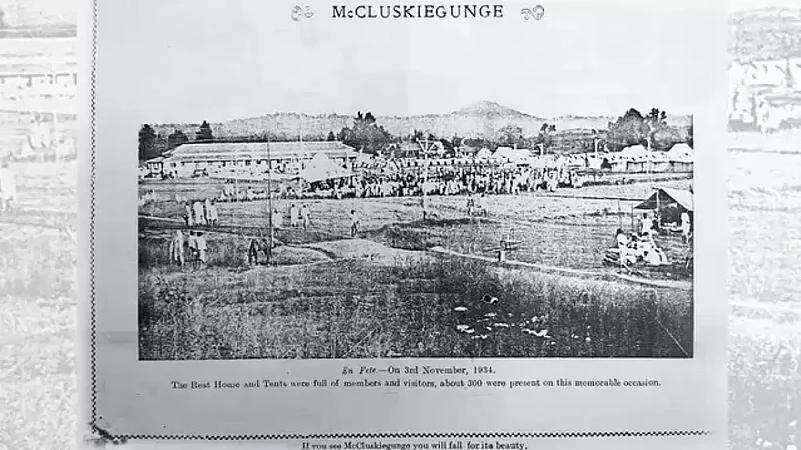“Do you understand the sadness of geography?”
—Michael Ondaatje, The English Patient
This is an ambivalent place, a place that defies the rules of any order. Here, the stayers-on are storytellers. There is only the past. A past that is not just history, but also a lot of memory.
Time is experienced differently here. Michel Foucault outlines in his book Of Other Spaces that “heterotopias are genuine locations that serve as ‘counter-sites’, symbolising, opposing, and inverting all other traditional sites, in contrast to utopias, which are imaginary, wonderful, and perfect surroundings”.
The Gunj is that. A place that was imagined as a utopia and later became the mirror in which the image you see doesn’t exist. In this place, there is a relationship between space, power, and resistance. Memory is its tool, its site, its only identity.
Geographer and writer Yi-Fu Tuan argues that a place is more than a location, it is a space full of meanings and objectives. Like the Gunj that transitioned between two phases of modern international history and the nature of Englishness, assuming a cultural authority that, in turn, implies citizenship.
In this case, a place for people whose country is not on the map. It lies in the realm of dreams. A dream that was lived. Even if for a short while. And like all dreams, they woke up from them. The people, the ‘stayers-on’ as they are called, the Anglo-Indians who decided against leaving, call themselves a “people of nowhere”.
In his book Beyond the Map, Alastair Bonnett says, “A place is a storied landscape, somewhere that has human meaning. But another thing we have started to learn, or relearn, is that places aren’t just about people; that they reflect our attempt to grasp and make sense of the non-human; the land and its many inhabitants that are forever around and beyond us.”
The sadness of the Gunj hangs from the tall Sal trees, it looks out of the old windows of old houses, it lives in its people. It is a place forever beyond us. A place of loneliness. A refuge for the misfits.
“Lonely Places, then are the places that are not on international wavelengths, do not know how to carry themselves, are lost when it comes to visitors. They are shy, defensive, curious places; places that do not know how they are supposed to behave.”
—Pico Iyer, Falling Off the Map
Deepak Rana, who is in his eighties and has lived here since 1968, says time, age, sadness, loss, goodness, happiness, and the concept of home are all here. All of these compressed into this landscape that was once conjured as a refuge for those who would seek solace in it. A community that hoped it would set up a homeland within a country. Now, all of it is done with. There are only stories left. In time, they’d be lost too. Where will the Gunj then place itself?
Rana sipped his drink quietly as he always did. Aunty Ruby, his wife, had already retired for the night. The cat was wandering inside the house as usual. Outside, the jungle resumed its dark glory. Acres and acres of Sal trees loomed in the distance. Uncle Rana’s mother had come here in the 1960s for a picnic and stumbled upon an old property and decided to buy it. That’s how it happened. This was a place that was still finding a footing. They weren’t Anglo-Indians but the Gunj seemed like it could be home.
“Why have you come here?” he asked me.
“Perhaps to see before it all vanishes,” I said.
“Why did you come here?” I asked.
“The world lay in front of me. I was young and free. But I needed to lick my wounds,” he said.
There was a pause.
“There is an escape for the restless. Like you and me. This is that place, a headstrong place that refuses to be anything but itself.”
McCluskieganj, a homeland for the Anglo-Indians that never quite became that, is exactly that. A stubborn place that lives on memories of those who first claimed it as home, a refuge for those who have continued to live there like Dennis Meredith and his daughter Karen.
Like Kitty Texeira whose eyes look like they compress the entire history of the place, the betrayals and the eventual abandonment. The poster child of the Gunj, Kitty’s insistence that this is where she was born and she knows of no other homeland other than this runs counter to those who had designated Britain as home without having experienced it. Kitty was an outsider. To her community that never quite came to terms with her wildness and to the locals, who called her memsahib and never quite took her in although she married an Adivasi man and had three children with him. She had sold fruits at the station ever since she was a teenager to makes ends meet. Kitty represents the counter to all the claims of grandeur here. For her, the Gunj was not an escape. It was home. It still is.
The Gunj is named after its founder, Timothy McCluskie who bought 10,000 acres of land from the Rajah of Ratu and sold the dream of a mooluk to the Anglo-Indian community. The Chhota Nagpur hills, with all their gentleness, surround this place. Within this place, there are villages where Adivasis live, weekly markets and many more guest houses now. There are also old English-style cottages, a reminder of what it was envisioned as.
This is an abrupt place, an anomaly too. A site of a political struggle, in terms of making itself a homeland for the Anglo-Indians so their Indianisation could be stopped.
In Collective Memory and Productive Nostalgia: Anglo-Indian Homemaking at McCluskieganj, Alison Blunt quotes from the memorandum written by Henry Gidney to the Simon Commission where Gidney says that “while the Community is mainly urban, the increasing pressure of Indianisation makes the exploration of fresh avenues of employment necessary, and settlement on the land should provide a ready solution for many who would otherwise be homeless and destitute”.
In the same book, she quotes from a 1934 article in the Colonization Observer that explained the three main aims of McCluskie’s scheme:
“[The aims of] our Community being the only Homeless one in this vast sub-Continent are:
Firstly, colonising with the express object of establishing a Home for itself, secondly, of securing a definite stake in our own Country thereby becoming Indians proper, without losing our identity as Anglo-Indians, and lastly, by getting together, we automatically open up fresh avenues of employment for future generations who will grow up in the Colony, and become practical farmers in due course.”
Another article in the Colonization Observer in 1939 said McCluskieganj sought ‘to build a new Nation and to create a new State’.
“McCluskieganj ‘is not merely to be a Colony, not merely a Home. It is to be the birth-place of a new people, a new race, and a new life which will make India proud of her foster sons and daughters who have been sorely neglected in the past,” it further said.
This is McCluskieganj¬ — Little England or Mini London, 1,500 feet above sea level, 70 kilometers from Ranchi, the capital of Jharkhand.
The settlement had attracted 250 Anglo-Indian families by 1939. In all of this, there was also the desire to free themselves of British patronage. Anglican bungalows with flower gardens and slanting tiled roofs were built. Two churches came up. A club, a post office, and an abattoir followed. Trains lugged their heavy wooden chests and other furniture. Lace and breeches were sold here. Cake and wine, too. For a while, it seemed like it would last.
But people left and now, only a handful of Anglo-Indians remain here. By 1955, the Colonisation Society packed up and the Gunj became a place for retired people. After the exodus, outsiders came in. Bengalis first. And then came the others. They came for the exotica the Gunj promised. A guesthouse owner said the Gunj is also theirs but everyone suffers from a colonial hangover.
In this idiosyncratic place, even this history is contested with people’s imagination. About the genesis of its name, one story goes as such. There was an Anglo-Indian man called Mac and he fell in love with a girl called Luskie here and their love met with a tragic fate and both killed themselves. That’s how this place in Lapra came to be called McCluskieganj.
There was a woman called Dorothy Thipthorpe who made jams and wine, and in those days, they say the market was better than what Ranchi had to offer. China silk, cigarettes, cakes, and everything else was sold here. There were dances and parties and a lot of cheer. The first phase of the exodus saw a lot of people move out. By 1997, out of 400 Anglo-Indian families, only 12 were left. Some efforts were made to revive the place but nothing happened. Yet the Merediths, the Jennings, the D’Rozarios, the Barretts, the Hourigans, the Perkins, the D’Costas or the Mendies haven’t abandoned all hope. It is the burial ground that holds the history and the secrets of this little town. There is no money to fix it and some graves are unmarked and only in the epitaphs of the old graves can one read some of the names. Nobody knows about some of them here anymore.
People still come here to find their lost homes. It remains a forgotten town which finds a mention in some of the stories of Bengali writer Buddhadeb Guha who once owned a bungalow here, and in a film called A Death in The Gunj made by Konkana Sen Sharma who spent time here in her childhood.
After the second exodus when the Naxals camped here, a lot changed. Still, the road goes through a forest and they say the ghosts keep a watch. The ghosts of those whose homeland this was. By the 1980s, it was a ghost town after the Maoists took control. When dusk falls, people retreat. Only the animals venture out.
Whats lies ahead?
In 2019, a bill was introduced in the Lok Sabha by Law Minister Ravi Shankar Prasad who said there were only 296 members in the Anglo-Indian community as per the 2011 Census. This has been contested by Anglo-Indian bodies. Between 1952 and 2020, two seats had been reserved in the Lok Sabha for members of the Anglo-Indian community. In January 2020, the Anglo-Indian reserved seats in the Parliament and State Legislatures of India were abolished by the 104th Constitutional Amendment Act, 2019.
(Chinki Sinha in McCluskieganj)



























